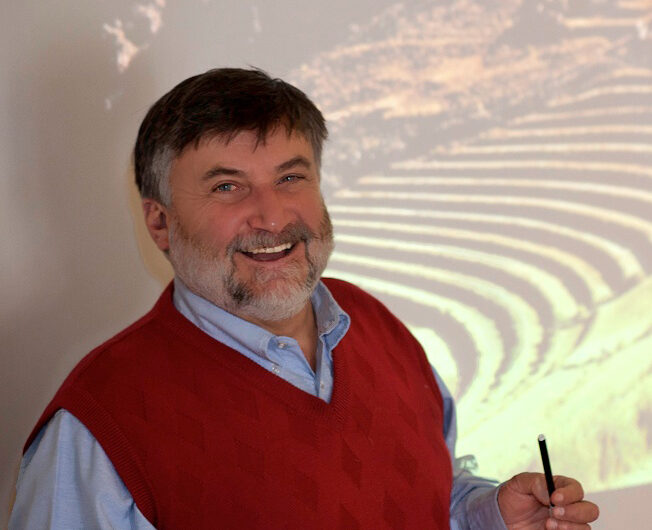During a trip to Cusco, I had the opportunity to meet with Dr. Jean-Jacques Decoster, one of Aracari’s top specialist guides who accompanies travelers on tours of Machu Picchu and is a rich source of information on the Incas and Andean culture. Dr. Decoster provides insider information for a privileged insight into Cusco and the surrounding area.
Aracari’s Cusco Specialist Guide Dr. Jean-Jacques Decoster
Dr. Decoster is a native of France, who now lives in the city of Cusco, where he is the Director of the language school and cultural center, Centro Tinku, the president of the non-profit organization, Asociación Kuraka, the French Consul and a National Geographic Expeditions Expert. He received a degree in Linguistics and Literature from the University of Lille in France and continued on to earn a master’s degree and a PhD in Anthropology from the University of Virginia and Cornell, respectively, as well as a doctorate in Social Sciences from the Universidad Nacional Mayor de San Marcos in Peru.
Professor of Anthropology
Over the past decade, he has held the positions of Professor of Anthropology and Ethnohistory at the Universidad Nacional San Antonio Abad del Cusco, where he teaches courses in Inca History and Andean Ethnography. Dr. Decoster’s major publications focus on aspects of the cultural anthropology of the Andes, and he actively seeks out solutions to development problems in rural areas, specifically, the relation between native groups and their environment; human rights and socioeconomic conditions of indigenous populations; and bilingual education in rural communities.
Aracari’s interview with Dr. Jean-Jacques Decoster
Recently I interviewed Dr. Decoster about his education, field of study, current projects and work he does in the region of Cusco, which you can read below to see why Aracari is pleased that our guests can meet and learn from such an interesting and active scholar in the region!
Aracari: How and when did you come to live and work in Cusco?
Dr. Decoster: I first came to Cusco in 1985 as a graduate student in Anthropology looking for a topic for my dissertation research. For the next 8 years or so I went back and forth between Cusco and Ithaca (NY). Two of those years were spent in a Quechua-speaking community south of Cusco, during the time of the Shining Path guerilla. After finishing my PhD at Cornell and teaching for a few years in a Graduate Program in the Social Sciences in Quito (Ecuador), I came back to Cusco in 1997 with another research grant, and ended up staying ever since.
A: What is the work you do at Centro Tinku and the non-profit Asociación Kuraka?
D: Centro Tinku’s main activity is organizing and hosting Study Abroad programs from US Universities. We also have a language school where we teach Spanish, Quechua, English, French and Portuguese. Also a small restaurant, Café Tinku, as well as a Travel Agency, Tinku Tours.
Asociación Kuraka activities center on small-size development projects, mostly directed at indigenous communities and women.
We also organize volunteering through another non-profit association, of which I am also president, called Experiment Peru, part of the Federation for Experiment in International Living based in Brattleboro, VT.
A: You’ve recently earned a tenured position at the Universidad San Antonio Abad del Cusco, teaching Anthropology. Congratulations! What courses are you teaching this year?
D: This semester, I teach a course on Ethnographic Literacy, focusing on Colonial chronicles, and on the limits between ethnography and literature. Also, a course on Ethnohistory for Archaeology majors, basically centered on the history of the Inca Empire. Finally a course on the Anthropology of Cusco.
A: You are currently doing research related to Inca archaeology. What sites have you been studying in Cusco and how is this different from previous research you have done?
D: This is a multidisciplinary research, still in its very early stages, looking at the spatial and structural relation between several Inca sites on the Inca trail, plus Machu Picchu, Vilcabamba, Vitcos and Choquequirao, –all of them part of the imperial extension towards the Amazonian rain forest that occurs in the 15th century. This is very different from any research I have done in the past, as I have generally tended to focus on historical documents and anthropological research.
A: For tours you often go to Machu Picchu; how has it changed over the years and what do you think about the most recent proposal to limit the number of visitors and time at the site?
D: The main change has been a ten-fold increase in the number of visitors since the 1980s. I do think that it is necessary to limit the number of visitors who enter the site. But this should be done while augmenting the qualitative experience of the visitor, rather than limiting it.
A: If I am visiting Cusco and have only 8 hours, in your opinion, what is the most important site that I should go see?
D: I would suggest a combination of sites to understand the complexity of Inca culture: Saccsahuaman, above Cusco, which appears to have functioned mostly as a symbolic battlefield, rather than an actual fortress; Koricancha, the Sun Temple, and center of the Inca state religion; finally Tipon, on the southeast edge of Cusco, a royal estate which is also a celebration of the dual passion of the Incas for water and for stones.
A: Coming from a country with one of the world’s best cuisines, how does Peruvian food compare with what you grew up eating in France?
D: Peruvian cuisine is undoubtedly one of the very best in the world, both because of the quality of its products (seafood from the coast, potatoes and quinoa from the highlands…) and the creativity of its chefs.
Expert guiding in Peru
Contact us today to arrange a tailormade trip to Cusco and Peru accompanied by Cusco specialist guide Dr. Jean-Jacques Decoster.

